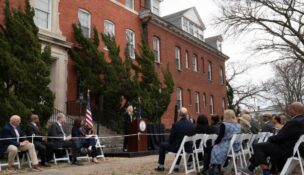Federal shutdown could have deep impacts in Va.
Government contractors are watching and waiting

A "danger" sign is posted at a work site on the East Plaza of the U.S. Capitol on Wednesday, Sept. 20, 2023. (Bill Clark/CQ Roll Call via AP Images)

A "danger" sign is posted at a work site on the East Plaza of the U.S. Capitol on Wednesday, Sept. 20, 2023. (Bill Clark/CQ Roll Call via AP Images)
Federal shutdown could have deep impacts in Va.
Government contractors are watching and waiting
In late 2018, the last time the federal government shut down for an extended period, Eric Ingram was furloughed from his job at the U.S. Federal Aviation Administration for six weeks. He used that time to co-found a startup focused on space safety, Scout Space.
Launched in 2019, the Alexandria-based technology startup now has several government contracts and completed a seed round of funding, securing an undisclosed amount of investment from venture capital firm Decisive Point and federal contractor Noblis. Ingram, Scout Space’s CEO, is carefully watching the situation this year on Capitol Hill, where Republicans in the U.S. House of Representatives had yet to come to a compromise as of Wednesday that would prevent another shutdown by Oct. 1. As a government contractor, he’s seeing the shutdown from a different perspective this time.
If the federal government does shut down, Scout Space may take what Ingram called a “proactive approach to control spending,” including pulling back on hiring, travel and nonessential purchases, like outfitting its new lab space in Reston. “It’s more of a precautionary thing for us, that we will just have to pull back on any unnecessary spending,” Ingram said this week. “Just to be safe.”
Government shutdowns impact many people, from federal employees who either work without pay or are not allowed to perform their jobs to families who won’t receive food stamps and other support. But in Virginia, shutdowns have a massive ripple impact.
The commonwealth is home to more than 144,000 federal civilian employees, the second largest state for federal workers in the nation behind California. On Wednesday, the White House Office of Management and Budget told federal agencies to be prepared to notify their employees of the status of government funding, The Washington Post reported.
Virginia’s also home to the world’s largest naval base and several other installations where active-duty service members would be required to show up to work but wouldn’t be paid during a shutdown. Four of the world’s six largest defense contractors are headquartered in Virginia, as well as a slew of other companies that contract with the federal government, offering services ranging from janitorial and security work to integrating network systems and health care management software to building nuclear aircraft carriers.
According to the Government Accountability Office, the federal government spent $637 billion on contracts in fiscal 2021; the ripple effects of a shutdown for businesses that rely on the federal government could be severe, officials told Virginia Business. In 2022, the Department of Defense spent $62.7 billion in Virginia, the most in any state, according to a recent DOD report.
Effect on smaller contractors
“It would have an impact on contractors kind of immediately,” said Jerry McGinn, executive director of the Greg and Camille Baroni Center for Government Contracting at George Mason University.
While some work may continue because of variances in contracts, including those that span multiple years, no new money can be spent, which means no new contracts will be issued during a shutdown, McGinn said. While government workers may eventually receive back pay, contractors do not have the same guarantee, he added.
“The bigger problem is if a contractor, if they’re not allowed to work on their contract because the government’s been furloughed, they’re not going to get paid for not performing work,” McGinn said. “That’s the bigger issue that’s going to impact companies.”
Smaller companies, those that don’t have the reserves of a large, multinational contractor, are going to feel that impact earlier and more sharply during a time in which banks may be less apt to loan money and interest rates are high.
“If this is a couple of days, that’s one thing. If it’s a couple of weeks, that’s another,” McGinn said. “If we’re into … multiple weeks and months, then that becomes potentially catastrophic, starting with the small [contracting businesses] and kind of moving up.”
Becky Reed, CEO of Suffolk-based Reed Integration, said she’s been following the news and checking in with her government customers on the status of her company’s contracts. “Luckily, we’re doing a lot of virtual work,” said Reed, “so we can keep going with most of our stuff.”
But Reed Integration, which provides systems engineering, project management and other services, also has the Coast Guard as its customer. If a base closes, that could impact the company, which relies on government contracts for 70% to 80% of its business. In that event, Reed said she hopes her employees can work from home. Some activities, like workshop exercises, may need to be postponed.
But there’s another looming concern: “When we submit our September invoices, if there is a government shutdown, there might not be anybody on the government side to approve our invoices,” Reed said.
During the last shutdown, which ran from Dec. 22, 2018, through Jan. 25, 2019, and was the longest in government history, it took a few months for contractors to get paid, Reed noted. “The only thing you can do to prepare is make sure that you can can manage your cash flow so that you have enough to cover payroll and all the bills.”
The Arlington-based Professional Services Council, a trade association that advocates for 400 businesses in the government technology and professional services industries, has been lobbying Congress against a shutdown and speaking to its membership in recent weeks about preparing for one. It’s harder to get out of a shutdown than into one, said PSC President and CEO David Berteau.
“To get out of it, Congress does have to pass something,” Berteau said. “And it has to be something the president will sign.”
Hampton Roads impact
In Hampton Roads, $4 out of every $10 is generated by the federal government, accounting for $40 billion to $45 billion in economic activity annually, said Bob McNab, an economist at Old Dominion University. For an area heavily reliant on defense spending, bringing essential service members into work without pay just adds to their stress, particularly if there are fewer federal civilian employees and contractors around to support them, he said.
That will also spill over into the business community, McNab added, affecting car dealerships, restaurants and the like while active-duty service members and their families are forced to curtail spending.
“It is this perfect storm that would really undermine economic activity in Hampton Roads if it continued for a long period of time,” McNab said.
Huntington Ingalls Industries, Virginia’s largest industrial employer and the nation’s only builder of nuclear powered aircraft carriers, declined to comment on the potential impacts of a government shutdown on its 44,000-person workforce.
“Given the uncertainty with the potential government shutdown, it would be premature to speculate about specific impacts,” company spokesperson Danny Hernandez said.
Other large contractors, including Tysons-based Maximus, which operates Medicare and Affordable Care Act customer helplines, have also said it is too early to speculate on the looming shutdown’s potential impacts.
With no deal in sight Wednesday, Tysons-based PenFed Credit Union announced it would offer emergency furlough assistance for members impacted by a shutdown, including interest-free loans, home loan hardship assistance and skip payments on qualifying loans. The credit union, the nation’s third largest, with $35.3 billion in assets, has 2.9 million members, largely from the military.
“PenFed understands the hardship furloughed employees face when they don’t receive the paychecks they rely on to pay their bills, buy groceries and support their families,” said PenFed Credit Union President and CEO James Schenck in a statement. “We are committed to working with our members to minimize financial impact and ensure their financial security.”
Given a tight labor market, Terry Clower, the Northern Virginia chair and professor of public policy at George Mason’s Schar School of Policy and Government, said the looming shutdown is also coming at a time where many employers will be reluctant to furlough any employees. “Probably, the contractors would be in a situation of trying to keep the folks on for as long as possible, even if it was eating into corporate profitability.”
And there is potential for even longer-lasting effects in Northern Virginia, including population loss and further labor shortages, Clower added. “A highly skilled federal worker … if you had a family to take care of in all this, you could rationally, reasonably come to the conclusion [of], ‘To heck with federal government, if they’re gonna start doing this on a recurring basis, I can’t live with the uncertainty.'”
t

















